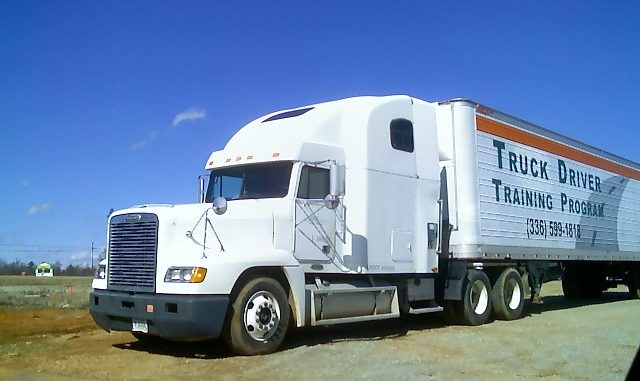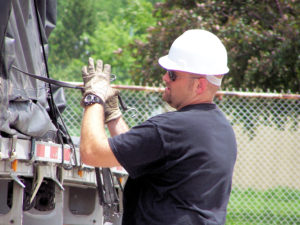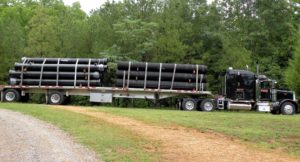
What was your career path? What do you like about truck driving as a job?
I got my first CDL at age 18 from a school in Goshen, NY. That was almost 30 years ago. At age 18, a fresh out of school teenage driver didn’t stand a prayer of getting a job driving, and I didn’t. Being a typical 1980’s teenager, I had no goal, held numerous meaningless jobs, and faced a dim future. Despite having my CDL, I wouldn’t become a truck driver for many years. And in that time, I would learn that the average pay for a truck driver is always changing.
Three years after graduating, the family moved to North Carolina, and I joined them. I started work in NC as a press operator for a manufacturing company. Five years later, I was earning twice the money as the shipping supervisor.
I moved back to NY working in another supervisory job when in 2001 the world caved in on me. Terrorist attacks shook the nation on September the 11th, I got laid off from my job, had a death in the family, went through a divorce, sold my house, and moved back to NC, back into more warehouse/distribution center jobs.

When I decided on a career change in 2008, I was making good money as a stocking supervisor in a large distribution center.
But one thing I learned is that if you don’t get up in the morning looking forward to going to work, you’re not in the right job.
I had always wanted to drive since I first got a CDL 20 years before, so at the ripe old age of 38, I quit my job to seek a new career as a tractor-trailer driver.
Just think – the open road, no bosses on top of me all day, no disgruntled workers, just me and the highway.
Being a truck driver can be just like working in an office; you still have paperwork to do, you still have to sign off on stuff, but the scenery outside your window is constantly changing! Gotta love it!
When I got my first CDL and there were no jobs, and I let my CDL expire rather than renew.
Now I needed to get a Class A CDL all over again, and that’s what I did – signed up for six weeks of driver education with tractor-trailers.
I chose a private school not far from home that had a good record of job placement after graduation.
I guess driving a tractor-trailer is a lot like riding a bicycle – – once you learn you never forget, and it felt awesome to be back in the seat of an 18-wheeler. Six weeks later, I passed the driver test on the first try and started looking for a job as a rookie driver.
Tip for new guys/gals: Most driver training schools have job information, carrier pamphlets, etc. That’s how I got connected with a flatbed company, TMC, headquartered in Iowa with a division in South Carolina.
But when looking at the schools, the types of jobs, and the miles you’ll get with each job, you should know that, even at a single company, the average pay of a truck driver is constantly changing.
Driving flatbeds isn’t like driving boxes. There’s a little thing called load securement that took me two weeks to complete with TMC just to know how to secure a load. And then, four weeks of over-the-road training with an experienced driver-trainer. Kudos to TMC for excellent training. Long story short, it’s at least three months after you decide on a career change before you’re ready for your very first solo, all alone, “only you” trip.

Here’s something else I learned about parking: If you’re OTR; with TMC you took your truck and trailer, loaded or not, home with you on your time off.
So just exactly where you’re going to park a tractor-trailer might pose a few problems.
There were no bonded, secured parking areas where I lived at the time and my house was a half-mile off a paved county road on a less than solid dirt road. In order to take the rig home, my Dad and I had to widen the single lane road over a drainage pipe by adding two sections of concrete culvert pipe and tons of stone.
Not to mention more tons of stone to stabilize the roadbed for a half mile. And then widening my driveway and adding even more tons of stone so I had room to back in with a 48 foot flatbed and possibly 80,000 pounds.
And installing security lighting, and making sure I’m insured. But we did it. Thanks, Dad.
What does it mean to be successful in this job?
This job, like any other job, is all about attitude. If you think it’s 40 hours a week and take home a paycheck, you’ll never be satisfied. You have to be flexible and accept there will be sacrifices. You may not get home every weekend. Every paycheck will be different. Some days might be 6 hours and some might be pushing the 14-hour limit.
You must be willing to expect the unexpected. Breakdowns, flat tires, missed delivery times. Some places will make you wait to unload your truck until the next day if you’re late with a delivery. That’s tough to take if you get there at noon, but you were supposed to be there at 9 AM. You have to look at the positives, the things you enjoy most about driving, and water down the negatives. But most of all, you positively have to make the commitment to put in whatever it takes to get out of it that which you desire.
How do you balance the mileage and money with the home time you want?
Before you decide to be a driver, discuss this with your family.

Be sure they understand what’s involved. If you need to go to driver’s school, can you afford to be without a paycheck for as long as it takes?
Be sure to fully discuss with a prospective employer all the details of what’s expected of you and what you expect from them.
Money and home time are linked together but on opposing sides.
In general, more money means less home time. More home time means less money. I have an uncle who was a delivery driver and paid by the hour. He made great money but sacrificed lots of home time. Other drivers I know constantly complain about the money, but they always push to get home as early as possible. You must learn to balance the two. Here’s what it comes down to in a nutshell – – you’ll get out of driving what you put into it.
What advice would you give to a new aspiring truck driver?
I love driving. I started out with flatbeds nine years ago and was home almost every weekend. Remember, you must take the good with the bad. Success doesn’t happen overnight. Just keep doing whatever it takes to get what you want. Take pride in what you’re doing. For me, every trip from point A to point B isn’t just another trip, it’s an accomplishment! Remember – – this country would come to a complete halt without tractor-trailer drivers.
If you work at it, the rewards will be there. I went from TMC flatbeds to OTR vans with Schneider out of North Carolina in 2011, getting home every weekend. Then came an opening for a regional intermodal driver that I jumped on.
With regional intermodal, you might get home once or twice during the week. With family in Florida, I inquired about openings in the area. Thirty days later I’m in Florida. The money is great and I get home every night. Schneider is great to work for, and just recently I made driver of the month in the southeast region.
What it all comes down to is this: driving can be a rewarding and satisfying career if you’re willing to put in the time and effort. And remember, some days you’ll be the pigeon, other days the statue! Stick with it and make it happen.
